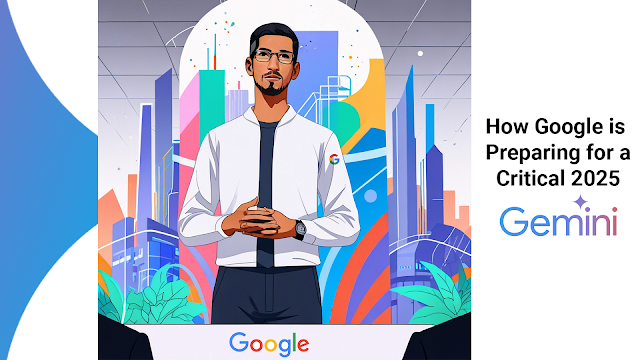At such light-speed evolution of the global technological ecosystem, 2025 already seems to be taking quite a defining form for Google. The Chief Executive at Google, Sundar Pichai, addressed its employees with a strategic, visionary outline and some sky-high stakes. Increasing tensions in AI competition to further regulatory scrutiny and unleashing transformative tools, among others, seem to come with monumental challenges ahead yet also with monumental opportunities for Google.
In this blog, we’ll dive into Sundar Pichai’s key priorities for 2025, exploring how Google is positioning itself for continued dominance in a high-stakes environment. Let’s uncover the strategies and innovations that will shape Google’s roadmap.
Why 2025 Could Be a Game-Changer for Google
1. Rising Competition in AI
The generative AI boom has unleashed fierce competition among tech giants. With OpenAI redefining user expectations via ChatGPT, coupled with investments from companies such as Perplexity and Microsoft in AI-powered solutions, Google is in a dash to maintain leadership.
To compete with competitors, Google has focused on its Gemini AI model that combines the latest tools with a chatbot for the mass consumer. Sundar Pichai emphasized that scaling Gemini will be at the heart of Google's 2025 strategy.
"We need to establish a leadership position for Gemini while solving real user problems," Pichai said.
2. Overcoming Regulatory Hurdles
Global scrutiny falls on Google. Regulatory pressure is heating up, and lawsuits claim Google is practicing monopolies in search and advertising. During the meeting, Sundar Pichai acknowledged the scrutiny but told the employees to stay focused and scrappy.
"Regulation comes with our size and success. Through this moment, we must ensure we don't get distracted," Pichai said during the meeting.
To overcome these factors, Google will increase transparency, which is bound to encourage more ethical AI development great balance for innovation against compliance.
3. Making AI More Consumer Friendly
Google envisions having an AI-driven universal assistant for 2025-it shall work intuitively seamlessly across domains, devices, and modalities. Project Astra, its experimental iteration will be a version highly improved to use and hence loved.
4. Genesis of the Gemini App
Pichai is betting big on the Gemini app, which Google believes can become its next breakout product with half a billion users. With consumer engagement at its core and user-friendly tools, Gemini represents the commitment of Google to solve real-world problems through technology.
How Google is Preparing for a Critical 2025
1. Scaling Gemini: The Future of AI Dominance
The Gemini app is not just another AI tool; it represents Google's ambition to redefine user interaction with technology. Recent months have shown strong momentum for Gemini, but Pichai admits there's more work to be done to bridge gaps and outpace competitors.
Key Features of Gemini:
- Advanced chatbot functionalities
- Multimodal capabilities (text, image, and video processing)
- Integration with Google's ecosystem, including search and Chrome extensions
Scaling Gemini will require aggressive marketing, user feedback loops, and continuous innovation to keep it relevant in a constantly changing market.
2. Investment in Ethical AI Practices
Google is looking to take the lead in responsible AI development globally. This will be achieved through:
Rigorous internal audits to ensure ethical compliance
AI frameworks that prioritize user privacy
Collaboration with regulators to establish fair practices
3. Doubling Down on Innovation
At the 2025 strategy meeting, Pichai demonstrated innovative tools, including Jules (a coding assistant) and Project Mariner (an AI-powered multitasking Chrome extension). These projects reflect Google's commitment to creating tools that improve productivity and simplify complex tasks.
4. Stay Scrappy: A Foundational Mindset
Though Google has plenty of resources, it is embracing the "scrappy" way. By fostering creativity in the face of constraints, the company is driving efficiency and innovation without over-relying on headcount.
5. Strengthening Core Businesses
While focusing on new technologies, Google will build more strength in its core sectors such as search ads and cloud computing. The company aims to add AI capabilities to these sectors to make user experiences more enhanced and revenues continue growing.
Scrutiny and Competition: A View from Sundar Pichai
1. Battles with Regulators
In 2023, Google was sued for monopolistic practices. It is, therefore important for 2025 that Google must consider regulation as an imperative.
2. Competition
With innovation in AI, competition comes along from OpenAI and Microsoft as well. Pichai would focus on reinforcing Google's brand value and showing clear value from Google's AI offerings.
Conclusion
Sundar Pichai’s vision for 2025 is a bold roadmap for navigating disruption, fostering innovation, and addressing global challenges. As Google scales Gemini, tackles regulatory scrutiny and embraces a scrappy mindset, the company is poised to turn challenges into opportunities. With the stakes higher than ever, 2025 could mark a transformative chapter in Google’s journey to redefine technology and its role in society.
Sundar Pichai’s 2025 strategy emphasizes AI innovation, regulatory challenges, and scaling Gemini for dominance. Discover Google’s roadmap for the future.
#Google2025 #AIInnovation #SundarPichai #GeminiApp #RegulatoryChallenges #TechLeadership #FutureOfAI #GoogleStrategy #ScalingGemini #DigitalTransformation #HowGoogleIsPreparingFor2025 #SundarPichaiVision2025 #GoogleGeminiAI #FutureTechTrends2025 #RegulatoryChallengesGoogle
